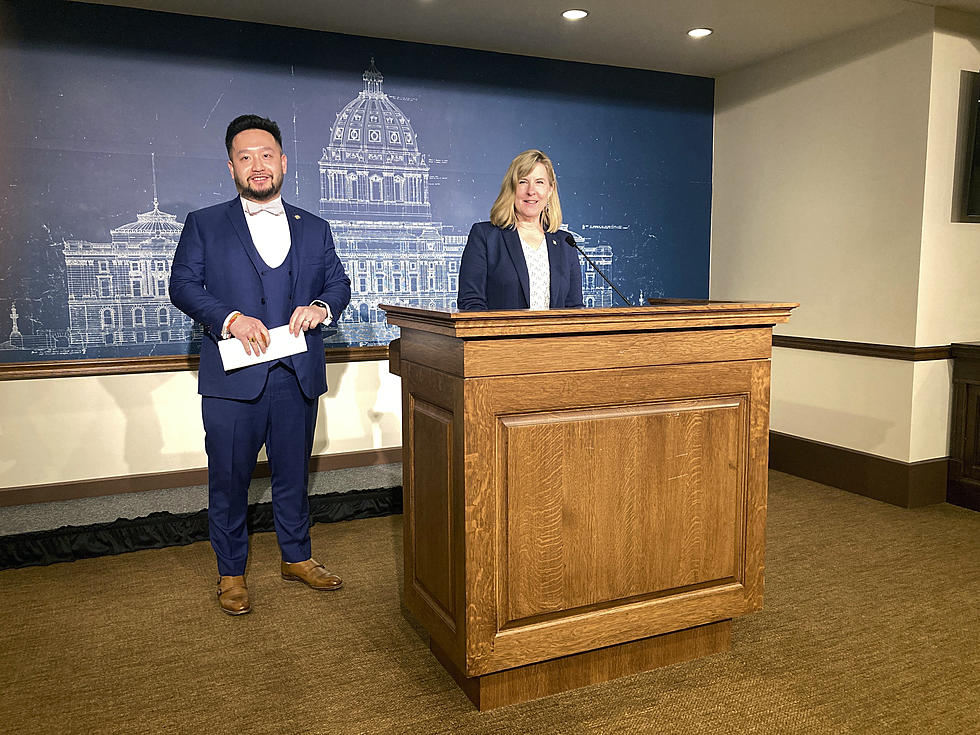
Minnesota House approves $1.9B public works package
ST. PAUL, Minn. (AP) — The Minnesota House approved a $1.9 billion public infrastructure package with bipartisan support Monday evening for fixing up roads, bridges, water systems, college facilities and parks and trails across the state, sending it to the Senate where its fate is less certain.
Most individual projects in the package were unglamorous and noncontroversial, with a focus on maintaining or replacing existing but aging assets in legislative districts statewide. They were split between one piece of legislation that called for $1.5 billion in borrowing, known as a bonding bill, and another that totaled about $400 million in cash.
Democratic House Speaker Melissa Hortman, of Brooklyn Park, told reporters that the two bills are “chock full of critically important infrastructure projects that will strengthen communities ... all across the state, and importantly will create jobs.”
But the politics of assembling bonding bills get complicated because it usually takes a 60% supermajority in each chamber for the state to take on more long-term debt. The House cleared that bar when it passed the bonding bill 91-43, with 21 Republicans joining majority Democrats in voting yes, more than the needed 11. The separate cash projects bill, which required only a simple majority, then passed 98-36.
But leaders of the Senate GOP minority reiterated at a news conference Monday that some kind of tax relief from the state's huge $17.5 billion budget surplus would be their price for the necessary GOP votes when the bill comes up in the Senate. Democrats hold a one-vote, 34-33 majority in the Senate. It would take at least seven Republican votes to pass a bonding bill there.
Hortman and Rep. Fue Lee, of Minneapolis, chair of the House Capital Investment Committee, framed the package as unfinished business from the 2022 session, when a bonding deal fell apart amid other partisan election-year disputes. They said they hope to follow it up with another public works package in the coming weeks.
If Senate Rep. KozniRepublicans don't go along, leaders of the House and Senate Democratic majorities have threatened to pay for a potentially much bigger list of projects just out of the surplus. What Hortman called a “with-or-without-you” all-cash approach would require only simple majorities to pass — and leave less money available for tax cuts.
Republican leaders from both chambers proposed a $13 billion tax cut wish list last week. It includes rebate checks, tax credits for families with children, eliminating the state’s partial taxation of Social Security income and lower income and property taxes.
Senate GOP leaders wouldn't specify Monday which, or how much, of those tax cuts they'll need to get to put up votes for a bonding bill but said they're open to negotiations.
“How can we in good conscience go back to the taxpayers of Minnesota and say, oh yeah, we have this historic surplus, almost $18 billion, but we're going to to put almost $2 billion on a credit card and not give you a penny of your hard-earned dollars back?" said Sen. Karin Housley, of Stillwater, the lead Republican on the Senate Capital Investment Committee.
Lawmakers haven't managed to pass a statewide projects bill since 2020, but control of the Legislature is no longer divided. Some highlights of the new House package include:
—Over $245 million for transportation projects, including $85 million for local road improvements and $67 million for local bridge replacements;
—Nearly $175 million for the Department of Natural Resources for state parks and trails, plus flood mitigation and wildfire suppression projects;
—Over $87 million for water infrastructure projects;
—Around $72 million for rehabbing public housing;
—Nearly $93 million for a long-sought new undergraduate chemistry lab for the University of Minnesota in Minneapolis;
—Over $31 million for upgrades at National Guard armories;
—Over $18 million for improvements at the Minnesota Zoo in Apple Valley.
Wow! Check out how Rochester has changed throughout the years in these Google photos.
More From Minnesota Now







